A change— a change— will do you good! A change will do you good! Unless of course you’re Betty and petrified of change. In the second mainstage production of the 2016/2017 at Strand Theater Company, now fully residing in Hamilton on Baltimore’s east side, Exit Pluto is ready to shake up the world of Betty and her bakery! In a TheatreBloom exclusive interview, we sit down with the creative team— including the director, playwright, lead actor, and the company’s managing director— to talk about the experience and the process.
Let’s do a quick round-robin of introductions and then we’ll get underway!
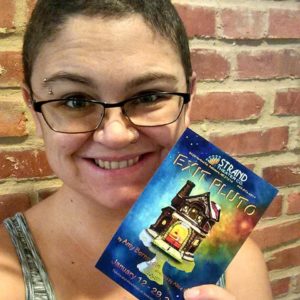
Alice Stanley: I’m Alice Stanley, I’m directing Exit Pluto. I co-run Cohesion Theatre Company. I recently directed Hamlet there. That went pretty well. I’ve written things and sometimes I act in things. But mostly I like to direct the things.
Elena Kostakis: I am Elena Kostakis. I am the Executive Director of The Strand. All I do and anywhere you have seen me is here at The Strand. I am here at The Strand 100%.
Amy Bernstein: I’m Amy Bernstein. I’m a playwright. My last full-length production was Raw which was part of the DC Women’s Voices Theater Festival, produced at Venus Theatre. I’ve had a lot of other short works done all around in various places.
Janise Whelan: I am Janise Whelan and I’ve been doing theatre for 30+ years in the Baltimore area, and I’ve been doing film in the last four. But this is the first time I’ve done a play since you saw me, Amanda, up at Milburn Stone Theatre almost two years ago in January of 2015 for August, Osage County.
What was it about Exit Pluto that made you feel it was a good fit for The Strand, Elena?
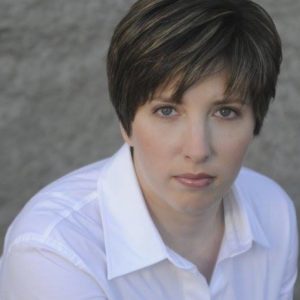
Elena: Well, I’ve been a long-time admirer of Amy’s work. I have seen the shorter plays that she’s mentioned; I have seen Raw. I have always appreciated the fact that Amy’s plays always respond to the latest, most urgently felt events and headlines, the things that we live through that are most current. And yet they don’t beat you over the head with it. They’re imaginative and inspired. I have been wanting to produce her work for a while. I had reached out to her this summer saying, “Is there a piece th% at you have that you like might to submit to The Strand that would fit our season?” You know this season 100% of our work is written by women. It is generally a part of our mission but we’re especially sticking to it this season with this being our inaugural season in this new space. So I’m very excited. I’m excited about the intention of the play, what it was inspired by, and it’s a privilege to have this material in our theatre.
Alice, what is it about this play that made you want to throw your hat into the ring for Director?
Alice: Obviously it wasn’t something that I had read before, this is a world premiere. I just met Amy a couple of months ago here at The Strand when we did a staged reading for Free Fall Baltimore. When I first read the script, I appreciated the intensity and the energy of it. Especially because coming from Shakespeare, I do a lot of heavy. That gets exhausting. It’s really fun to work on something where people— I should be clear that in this play people aren’t running around being happy all the time, there’s a lot of conflict, there’s a lot at stake— but it’s really high energy, completely throw-yourself-in, run around in circles and I like that a lot. I think it has a sort of lesson. It’s not heavy handed with it but there is something to be taken away from it and I like that.
Amy, would you like to tell us a little bit about what Exit Pluto is and where it came from?
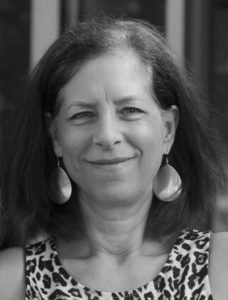
Amy: Everything I write is political in the sense that politics is about how people get along with each other and how groups get along with each other. I never write something that’s polemical, but it could be political in that it’s about the rules that we either agree to or the rules that drive us apart. Everything I write turns out to really be like that because it’s what preoccupies me so much. I always want to find a theatrical way into that. For me, it’s never about the naturalistic storytelling. You know, a powerful play like Death of a Salesman, it’s not entirely but it’s mostly about naturalistic telling of this incredibly tragic story of that man and his fate. It’s political in its way.
I’m really interested with the same kinds of concerns because it’s the forces that act on people but I try and get it at very around the back door. That’s probably because I don’t ever want to write something that’s just preachy and obvious. I so want to avoid that that I go way around the block like several times. This play, and it’s interesting because I wrote and finished it several months before the outcome of the election, is very much about that clash of tolerance. The origin of the piece was that notion that someone who perhaps runs a bakery or some other type of retail establishment can deny service to someone else simply because they disagree with the way they live their lives.
Maybe they’re gay and they want to get married. Maybe you run a bakery and so you will not bake their cake. There’s a famous case where the court clerk refused to issue the marriage license to the gay couple. There’s that notion of your system versus my system, my world versus your world, and something’s got to give. It’s very hard for that to co-exist without something bending or breaking in the middle. So what happens in Exit Pluto is, in its own way there is that clash of systems of lives, of beliefs, of ways of being, of ways of seeing the world, and something has to give. In this case it’s really ultimately Betty who gives and it’s the other side who is empowered. And you could write a piece that could go either way, but that’s how I did it. It started with that basic idea of a baker refusing to make a cake for a same-sex couple.
It takes place in a bakery. And we’re setting up shop with a bakery, there’s lots of baking going on here. Do you like to bake, Amy? Or where is that coming from?
Amy: No. It really just came from that idea. In fact, I don’t like to bake. I don’t even like sweets. So it was some other part of brain doing all the tasting there. I grew up eating them, of course, but I don’t like sweets at this point in my life.
How do you feel about baking, Janise? Do you bake?
Janise: I have in the past. Don’t have time anymore. Don’t have the little kids that I’m baking for anymore. I enjoyed playing with it.
You’re playing Betty, our protagonist. How are you finding yourself to be similar to her or different from her?
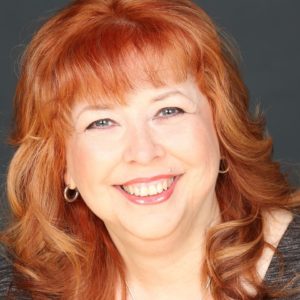
Janise: I think the vulnerability parts of her is more me. Who she is at the very beginning of the play, I’ve had other people tell me that I’m not like her at all and that they just don’t see it. So it’s been really fun to play somebody who is against who I am. I think there is a lot of her in me in a lot of respects. I like the different layers that this lady has. Even at the end, when you just said she’s the one that changes, my brain is still thinking— everybody else has changed and are the same. And it makes me wonder where’s the next chapter after that.
Amy: I’m glad you used the word change. The play is about fear of change. Whether it’s going to work for you or against you it’s a really hard thing to come to terms with, particularly if the world around you is changing in ways that you didn’t sign on for. So that baker, who doesn’t want to make the cake for that couple, that’s not the contract she has with the world. Some people can go with the flow on that and some people can’t. And that’s the world we find ourselves in right now.
Amy, you were saying you had finished this months before the election results. Do you think that because of the way the election panned out that people might view this play differently?
Amy: Well, I’d love to find someone who sees the play and reads that much into it. But I think that to the extent that people see people locked in positions and world views who wind up being incompatible, I think unfortunately that’s a reflection of where we are so much today in our public and even our private discourse, that might impact how they look at the work. I think that is going to preoccupy me for the foreseeable future. I’ve already started a new piece that focuses on that clash and disconnect where it’s almost hard to live your own life because of the difference that’s around you. It’s very anxiety-provoking.
What would you guys say has been the biggest challenge working on this project, Exit Pluto, up to this point?
Elena: I will start because I have not been challenged by this. For me this has been nothing but joy to produce this piece. I’ve loved the text from the beginning. I think it fits our mission like a glove. There is a beautiful team we’ve put together working on this who I am confident will interpret it in the best possible way. I’m just very happy and I have nothing to complain about. At least not yet. I mean, the snow might come.
Alice: It has been fun. But also a little bit challenging. The way that we are going in rehearsals is that there are kind of different worlds that exist subtly within the play. Betty says at one point she’s not sure at what point the bakery stops and she begins or she ends and the bakery begins? Something like that.
Janise: I’ll tell you when I learn that line.
Alice: Janise can tell you on the 12th! We’ve been kind of running with that in terms of sometimes it’s more realistic, like what a security camera might show, versus sometimes it’s in Betty’s head, versus sometimes it’s a flashback. The scenes are very fluid. So finding that is really coming out of how we’re painting these characters and moving into different feels at different times. It’s a lot to discover and there is a lot of texturing we’ve been doing in rehearsal. Betty tends to be very heightened most of the time and exist in her own little dimension that would not be a regular bakery. But during one of the rehearsals we sent two of the other characters in there and for once Janise got to use a regular tone of voice and ask a question in a genuine way. It’s a balancing act so that we’re not just flying all over the place. Everything is very intentional, very purposeful, and very calculated and done carefully. I think that people don’t realize sometimes about something that looks very chaotic. If it’s both chaotic and a whole then somebody spent hours making it like that.
Amy: To create the disequilibrium, behind the scenes you have to have created equilibrium. The audience should feel off-balance but there is a method behind the madness so that they feel the disequilibrium without the actors having to experience disequilibrium.
Alice: There’s definitely a lot of madness.
Janise: This play is perfect for small and intimate theatre. It’s so much fun to see how these characters are and being in the audience, it’s going to be easy to be drawn to them. I think the challenge for me is just finding the subtle changes of who she is. When you do the flashback that’s one thing, but when you’ve got Simone popping in and other things happening, “where is Betty?” That’s fun to play with.
Amy, what was the challenge for you?
Elena: I said “I need the script by…” and that’s when you have to have it finished!”
Amy: Haha, yes, there was that, though that’s a deadline, not necessarily a challenge. But I guess for me, and this is a really personal answer, but every time I’m writing there’s the lack of faith that there is any value in what I’m putting on the page whatsoever. So you have to fight through that just to finish the damn thing. Don’t abandon it, just figure it out. Tonally, making sure that interplay was there, and keeping it heightened in certain respects, and it’s both realistic and unrealistic, there’s so much going on! What I think I’m trying to say is, I try to write plays where there is an internal logic that’s really strong but what’s happening in the performed sense may be ridiculous, chaotic, crazy, and weird. It seems not logical but there is a logic to the play, there are rules of the play. That was the challenge! I wanted the rules of this play to cohere, because then I know somebody like Alice can come along and take that freedom. The rules of the play are strong enough to let others really do their thing with it and that was really difficult.
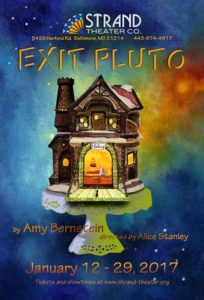
Is there a moment in the show that speaks to you as an individual?
Janise: There’s this thing that keeps happening where they’re trying to tell a story. Every time I hear one of the characters starting to tell the story to me, it’s always that unfinished “what’s going to happen after that?” and it gets at you. What happens to her? I’ve got to know! There have been so many times in your life that you just want to know, but honey that’s life, you ain’t gonna know. I like that, it happens near the end. Betty lives so much for these stories that keep her in her little cocoon. “Make me happy, tell me a story, no matter what it is,” I think that applies to all of us, no matter what’s going on in your life, where we can relate to that.
Amy: You’d think I’d have an answer to this on the tip of my tongue, wouldn’t you? I think to me; I think that question becomes “what’s the emotional heart of the piece?” That’s just my interpretation of that question. But for me, the emotional heart is a twin thing. Lulu’s discovery that she’s not alone in the world, that she has a connection, coupled with Betty’s final break, realizing that her brittle reality isn’t cutting it. Those are two really, really big realizations and one happens toward the end and one happens at the end. Those are transformational because those characters will never be the same again. There’s so much about finding love, about loss, about being alone, and about that intense need to protect what you have and fear of giving that up because you don’t know what else there might be. I think that’s probably too broad, but I think that’s my answer.
Elena: I think I relate to Betty in the sense that perhaps she is sort of an exaggeration of what many of us do in life anyway and that is construct their own sort of reality. Certain things we like to have tidy in our lives and we like to have our friends a certain way and our family a certain way. When that crumbles, maybe not to that dramatic a degree, but to some degree, I can relate to that experience. I also feel like the storyline between Betty and Hector really resonates with me as a parent. She puts so much of her hopes into him and he is ultimately the reason everything unravels. Some children I know, they better not—
Amy: But that’s what they do. Children, they grow up and they leave us. And that’s change.
Elena: You have to exist as your own person outside of your children.
Amy: If you don’t accept that, you know, you wind up getting kicked out of your own bakery.
Elena: Like I said, it’s a dramatic interpretation of what we all go through. But I think it’s the Betty Hector line that’s most touching.
Alice: What sprang into my head when you asked Janise this question was just this moment that’s been really nice in rehearsal. Lulu is the kind of protégé/apprentice/slave— question mark? They have a military sort of— is there a military apprenticeship?
Elena: Not yet. But that’s where we’re going.
Alice: I know, right?
Elena: Even if she’s a slave, she’s a willing slave. She sold herself into the slavery.
Alice: Yes. She works at the bakery under Betty’s iron rule. There is a time where it’s Lulu’s first time alone on stage, I think. She’s talking about how she’s a soldier, she’s a Navy Seal, she’s marching, and then she transitions into this very genuine moment and she has this dream where someone is going to come up to her and say “you make magic that melts in my mouth.” And then she continues to talk about this woman who is going to compliment her baking. It ends with the notion that everything will be happy and good because someone at last has noticed. I think that was what Amy was talking about with Lulu finding the human connection. When we have these very strict world views of what we are and aren’t willing to accept about the world that ends up taking priority over any real human connection that could be felt. It speaks to that fundamental human desire to be seen, noticed, and appreciated and feel like somebody sees you for what you are. It’s a really lovely moment.
Where did the title come from?
Alice: You won’t know until the last line!
Janise: That’s right.
Elena: That means you have to come see the play!
Amy: It was actually one of the first things that came to me and I said “well, that’s what it’s called.”
What is your favorite baked guilty pleasure?
Janise: Pineapple Upside Down Cake.
Oh, that sounds lovely! Do you make it?
Janise: No. If I want to enjoy what I’m eating? No.
Amy: A really dry, hard, low-sugar biscotti from Vaccaro’s.
Elena: I want that stricken from the record because nobody is going to come see this play with that answer!
Amy: I really don’t like sweets!
Alice: Really dry.
Janise: Really dry and low-sugar. Does that even count?
Elena, please redeem that question. What is your favorite bakery dessert?
Elena: My favorite dessert is something that could never be found at Betty’s bakery.
Alice: Because?
Elena: There is no chocolate in it.
Alice: Nailed it.
Wait. What? There’s no chocolate in your dessert? Or there is no chocolate in Betty’s Bakery?
Elena: There is no chocolate in Betty’s Bakery.
Oh my goodness, what is wrong with Betty?
Janise: You have to come and see the play and find out!
Elena: There are a lot of things wrong with Betty. But my favorite dessert is molten chocolate cake with vanilla ice cream. And no, I do not make it. It’s so hard to make! I buy it, I warm it up, and I put ice cream on top!
Alice: I like cheesecake. I don’t eat it very often. Back when I was a vegan, when I was a teen, I made vegan cheesecake. But I’ve never made non-vegan cheesecake as a non-teen.
Elena: Here is something interesting you would like to know. We will be serving cake at every performance. There will be cake here with your play.
Janise: Chocolate or not chocolate?
Elena: Probably not chocolate. But we will see. Depends on the baker we’ve connected with. But we are hoping to create an immersive experience so that the moment the people come into the theatre they will smell the smells.
Amy: You know, after Raw, I vowed I was never going to write about food again…
Alice: How’s that working out for you?
Amy: Actually, there are donuts creeping into my new play.
Alice: Are you just hungry when you write?
Janise: It’s all those sweets you think you don’t like. This is your brain telling you that you actually want them. Give up on that dry biscotti.
Elena: You know the moment you start eating them, your brain might say “Eh…I don’t need to write about it anymore…”
Let’s go hard— like the dry biscotti— and deep— like chocolate— what have you learned from this experience?
Janise: I really have to think about that one, but I think I’ve learned nothing is ever as it seems, for sure. A friend is a friend is always a friend, not necessarily, but could still be. I would think that the experience of how we’ve been presenting this, we’ve got a good group of people. The girl playing Lulu (Barbara Hauck) is just killing it. I’m laughing my ass off with that girl and I can’t keep a straight face with her, she just cracks me up and is very easy to work off of. The whole cast is just great. What have I learned? You get a good group of people together…and all of us are enjoying the process. We’re all curious. We all want to know.
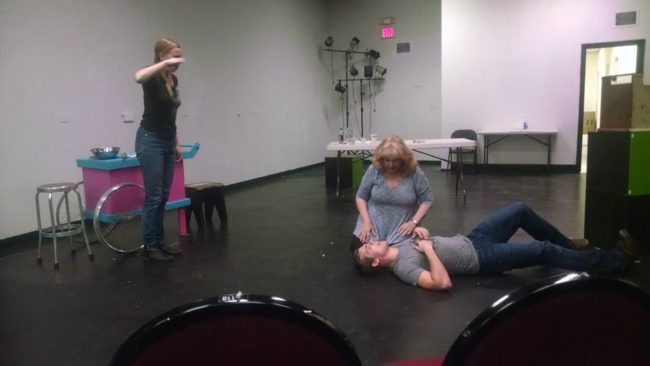
Amy: We had a reading at the Kennedy Center over the summer, but this is the first time I’m seeing it on its feet so I sort of want to reserve judgement on what I’m learning. But I will say that if you try so hard to just create a world on the page, the world can live off the page. That’s what you have to have faith in, that that happens. It’s a very weird process. It’s just words on paper. How do you know that there’s anything in the three-dimensional world that can resonate at all? When you see that that can happen, that’s where I learn. That can happen, I just think that’s magic and I just want to do that all the time.
Elena: I think if anything it just reaffirmed my love of doing great work. I completely agree with what Janise said about getting the right team together. Alice and I were doing casting together and there were moments of complete chaos and panic where we weren’t sure if it was going to come together, but then when Janise came—
Janise: I was a fluke. This is the story of my life.
Elena: Yes, but there was a moment of relief when she floated through the door. I don’t know that I learned this, but it got reaffirmed, but I have 100% confidence in Alice. I was so excited to get Alice on board and of course I was ecstatic since the summer with Amy, and now every actor we have just gets me so excited. And the designers too! The designers are just brilliant. It’s wonderful to have such a fantastic team together.
Alice: I thought of something! I need to say it before I lose it! Character dynamics! I can’t package this in lesson format. I just sort of have to explain what I’ve been observing. In Shakespeare, you tend to just have 30,000 people on stage at any given time and they just shuffle around making noise. In this there are five characters. It’s such a lovely size for a cast. I’m bubbling about it. It’s so easy. Amy has set up these characters and defined them so well that when one enters, it’s like a different world. Any combination of people is totally different because there’s only five of them. Each of the characters takes up 20% of the world, and just thinking about how that works and how people are different based on who else is on stage with them, it’s a really fascinating discovery for me. It’s not a lesson, I don’t think. Just an observation.
What is it that you are hoping that the audience is going to take away from seeing Exit Pluto?
Janise: This play is written with such an entertaining way to get to the point at the end, so I’m hoping that— and I don’t want to say I hope that they pay attention— but I’m hoping that they don’t just tune into the absurdity and zone out with it. There is an underlying reason that these things are happening on the stage, so I’m hoping that while they’re enjoying it that they’re hearing what we’re trying to say. That they understand why we have to go around the block several times to get to the point we get to at the end.
Amy: Wow, actually that’s a lot of it. Don’t be distracted by what could seem like silly stage play. There is a deadly serious purpose to it, it’s difficult, and it’s sad, and it’s there. But that does not mean that the play has to be sad. The miasma and all that, it’s there.
Janise: That’s a great word.
Amy: I love that word.
Elena: I hope, like I said at the beginning, Amy’s work is very thought-provoking without hitting you over the head with it. So I hope people think.
Amy: I hope people come.
Elena: I hope people come too. I hope people think about it. I remember that Raw, for me, was definitely a play that made me think about things in a great introspective way. So I hope for the same with this piece. I hope that this also communicates with people who maybe have not seen work at The Strand before, they see that we represent a very clear and strong female point of view, and that it continues to be our mission and they will continue to come and see our work.
Alice: I hope they leave feeling a little bit winded. And like they want to be a little bit kinder. I hope that they question what they hold dear. We would look at the play and say, “these people care way too much about baking.” Which is true. That’s not wrong. But I would hope that it would reflect back and make an audience member think “what are my reasons for the things I care so much about and are they really more reasonable or are they just more socially accepted?” That’s my hope.
If you had to sum up the entire experience in one word, what would it be?
Janise: Powerful.
Amy: Crazy.
Elena: Oy.
Alice: Batter.
Why should people come out to The Strand and see Exit Pluto?
Janise: Hey, you got a sweet tooth? Come on out!
Alice: Free cake! What more do you want? Cake. And theatre.
Janise: It’s been interesting and very welcoming to see The Strand here in Hamilton. It feels very open. I live literally up the street, so I’ve had people— neighbor friends of mine— who are so excited because they don’t have to travel to go see my show. It’s going to be fun getting to see everyone having this nice experience here in Hamilton.
Amy: I really, really believe that especially now that the arts help us make sense of the world around us. The arts help us find ways of talking about things that we can’t find other ways of talking about. The arts help us think about things in new ways that just help us open up our minds. This play, but really any play and almost any art form, is just a really helpful way to help make sense of the real world that we are in. Whatever is creating anxiety for you now, the arts are unbelievably essential to helping us work through it.
Elena: I would like to attach myself to that answer. That is what I hope for as well. I hope for people come for a comforting and healing experience. To me, this play has always just been a beautiful piece of theatre, which I find very comforting. The play subject matter may not necessarily be that but I think that the whole experience and thought behind it will be. Hamilton has been amazing to us and I hope to give that welcoming and wonderful experience back to the community and to give that experience to our audiences throughout Baltimore who have been following us for nine and a half years. I hope that they will brave the weather, that they will come, and we will give them cake and coffee— not just any coffee, Zeke’s— they’re right down the street!
Alice: It’s fun. It’s crazy. It’s dialed up to 11. And I think people will like it.
Janise: Good answer! Short, sweet, to the point, and BOOM!
Exit Pluto plays through January 29, 2017 at Strand Theater Company— 5426 Harford Road in the Hamilton neighborhood of Baltimore, MD. For tickets call the box office at (443-871-1917 or purchase them online.

